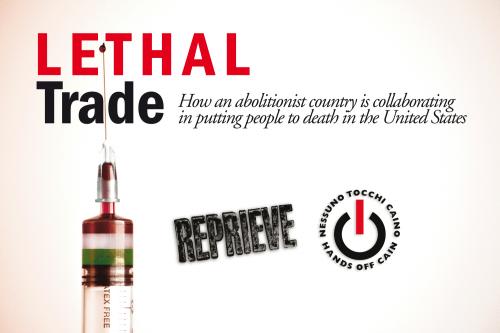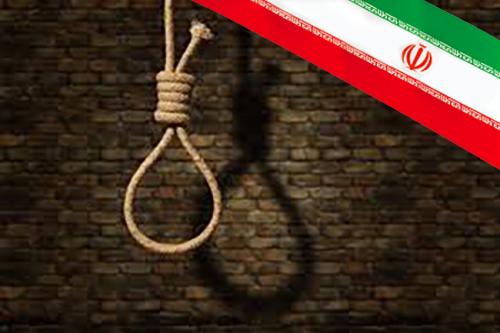12 January 2017 :
INTRODUCTIONby Elisabetta Zamparutti
Treasurer of Hands Off Cain
It is bad enough that the death penalty resists in the oldest democracy in the world, the United States, and is still characterised by elements of racism and arbitrariness in its application. Yet, it is even more disturbing to witness the consequences of the so-called civility of lethal injection. Hands off Cain played its part in December of 2010 when, with a motion approved by Parliament, it committed the Government to investigate the entire supply chain of Pentothal that the U.S. pharmaceutical company Hospira intended to produce in Italy at its production facility in Liscate with the objective of assuring that the drug would not be used to carry out the death penalty. We managed to totally block the production of this drug by the company. Following this decision, other multi-nationals introduced blocks and safeguards in order to prevent this anaesthetic and other drugs under their production from ending up in the prisons of the United States to be used for lethal injections. The increasing shortages that followed pushed some U.S. States, not only to create new lethal injection protocols or to substitute Pentothal with other pharmaceuticals, but also to risk following avenues that could force America outside the rule of law and the very principles on which the Nation was founded.
Given the almost insurmountable difficulty in finding these lethal drugs normally on the national and international market, penitentiary authorities began turning to small laboratories which are known in the USA as “Compounding Pharmacies”. The step over to this new type of “supplier” was accompanied by a series of “Secrecy Laws” that allow penitentiary officials to not respond to journalists, lawyers or human rights groups when they request the names of suppliers, and generally bar any public oversight by those who oppose the death penalty. Of the 32 states that still use lethal injection, at least 11 – Arkansas, Colorado, Florida, Georgia, Louisiana, Mississippi, Missouri, Oklahoma, South Dakota, Tennessee and Texas – have adopted secrecy laws that prevent the public or inmates from knowing the source of execution drugs. Among these States are the most active States in the U.S. in terms of carrying out executions: Texas, Florida, Missouri and Oklahoma.
The increased secrecy around lethal-injection drug protocols is only the latest tactic of pro-death-penalty legislators and corrections officials around the country in their bid to continue killing in a “civilised” manner. Prison officials said that revealing the supplier of the drugs could be dangerous if disclosed. In particular, the compounding pharmacies would be easily accessible to the public and present a soft target to violent attacks. Conversely, attorneys representing death row inmates say they need the information to verify the drugs’ efficacy and protect their clients from cruel punishment.
Attention has been drawn to the secrecy issue by the botched execution of Clayton Lockett in Oklahoma on 29 April in which the prisoner took 43 minutes to die, apparently in great pain, from an untested cocktail of drugs whose source was not made public. Lockett’s lawyers had argued in advance that he might be subjected to cruel and unusual punishment as a result of the lack of information surrounding the drugs, but the state supreme court allowed the procedure to go ahead having come under intense pressure from local politicians, some of whom threatened to impeach judges. In the wake of the “Lockett case”, Oklahoma has agreed to pause for six months before carrying out any further judicial killings to give time for an internal investigation to be completed. President Obama described the Lockett execution as “deeply troubling” and has asked US attorney general Eric Holder to review the way the death penalty is conducted in the USA.
On 15 May 2014, the growing secrecy adopted by death penalty states to hide the source of their lethal injection drugs used in executions was challenged in a new lawsuit in Missouri, which argues that the American people have a right to know how the ultimate punishment is being carried out in their name. The legal challenge, brought by The Guardian, Associated Press and three largest Missouri newspapers – the Kansas City Star, the Springfield News-Leader and the St Louis Post-Dispatch – calls on state judges to intervene to put a stop to the creeping secrecy that has taken hold in the state in common with many other death penalty jurisdictions. The lawsuit argues that under the first amendment of the US constitution the public has a right of access to know “the type, quality and source of drugs used by a state to execute an individual in the name of the people.” It is believed to be the first time that the first amendment right of access has been used to challenge secrecy in the application of the death penalty.
Following the execution of Clayton Lockett in Oklahoma, the U.S. magazine “The New Republic” published the horrifying photos of the execution of Angel Diaz by lethal injection carried out on 13 December 2006 in Florida, emblematic photos which we decided to publish as the cover to this Report. The chemical substances, injected poorly, burned the skin of Diaz’ arms, which began to peel back revealing the sub-cutaneous white tissue beneath. This would seem to be in direct conflict with the Supreme Court ruling, handed down in 2008, which posits that lethal injection does not represent “cruel and unusual” punishment, hence is not unconstitutional. Above all, it shows that no humane way exists for killing another human being.
This is not only a question relative to the death penalty, which is already considered throughout most of the world to be completely antiquated, inhuman, useless and costly, but also a question relative to human rights in general. In the so-called “free”, “democratic” and even “abolitionist” world, the connotation is that of a “real democracy” regime, the opposite of Democracy itself, as was seen with the “real socialism” regimes, themselves the polar opposite of Socialism itself. Today’s reality is that of the De Facto Power of “real democracies” which run rampant over the Rule of Law, Democracy and the United Nations system encompassing pacts and conventions on Human Rights. It is the manifestation of the Reason of State, State Secrecy, showing itself again after fifty years with tremendous technological and structural capabilities running amok, the same manifestation that Ike Eisenhower prophetically warned against a half-century ago in referring to the “military-industrial-congressional complex” as the greatest threat to the world and the United States itself. Emblematic of this point of view is the use of the United States of armed drones for the “targeted” elimination of certain people based on decision processes veiled in secrecy.
In this Report, we classify as “extra-judiciary executions” all the beheadings, stonings and shootings carried out by the Islamic extremists of Al-Shabaah in Somalia, by the Taliban in Afghanistan and Pakistan, by Al-Qaeda-linked extremists in Yemen and by the Sunni jihadist group Islamic State of Iraq and the Levant (ISIL aka ISIS) in the areas under their rule where they enforce a severe interpretation of Sharia law. Yet, there still exists no classification for the killings carried out by pilot-less planes, the so-called drones, which, according to estimates from the New America Foundation in Washington D.C. and the Bureau of Investigative Journalism in London, as of February 2014, have killed 4,700 people, including civilians, in Afghanistan, Yemen, Somalia and Pakistan.
The attacks with these pilot-less planes are often veiled in secrecy and they have increased in frequency, above all, under the presidency of Barack Obama. These murders have extended to American citizens abroad suspected of un-American activities, citizens that at home who would have had a guarantee to a fair trial, even under the jurisdiction of a system antiquated enough to still include the death penalty among its laws. Glenn Greenwald, the former columnist for The Guardian who first broke the story about Edward Snowden, commented on the possible use of a drone to kill an American citizen, member of Al-Qaeda, that was actively planning attacks against the United States abroad, in the following terms: “The very idea that the U.S. government suspects an American citizen, not of having already engaged in crimes, but of planning to do so, it’s like a pre-crime framework, where the U.S. government tries to guess at who will engage in crimes in the future and then treat them as a criminal. But then, not just treat them as a criminal, but declare them guilty in secret proceedings, not involving any court, but by the decree of the president of the United States.”
How to define these killings carried out by U.S. authorities without a trial, on basis of suspected anti-American activities, in the name of the world war against terrorism: legal executions? Summary executions? Extra-judiciary executions? The Secretary General of the United Nations Ban Ki-moon declared that “The use of armed drones, like every other arm, should be subject to international law, including international human rights law.” We believe that an International Pact to at least regulate such practices should be put in act if not, as I believe should be done, to ban them outright, as has been done with anti-personnel mines and weapons of mass destruction.
International pressure could help the United States to slip out of its contradictions, unsustainable in my opinion, in wanting to assure humane standards regarding the death penalty. This fall, the General Assembly will vote on a new resolution for a moratorium on capital punishment and the United States could consider voting in favour of a moratorium on executions, or at least abstain from voting, as a sign of coherence, not only with the concerns expressed by President Obama after the execution of Lockett, but also in the face of the new reality of the American Federation where, already, the majority of its jurisdictions – 28 out of 53 – either do not have the death penalty or have not practiced it in at least ten years.






